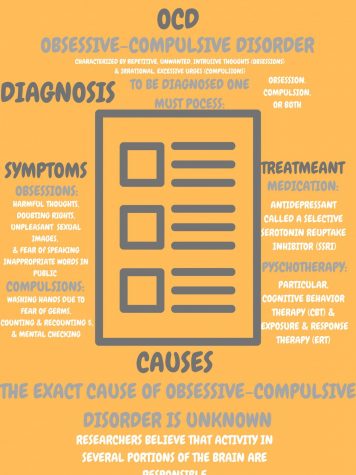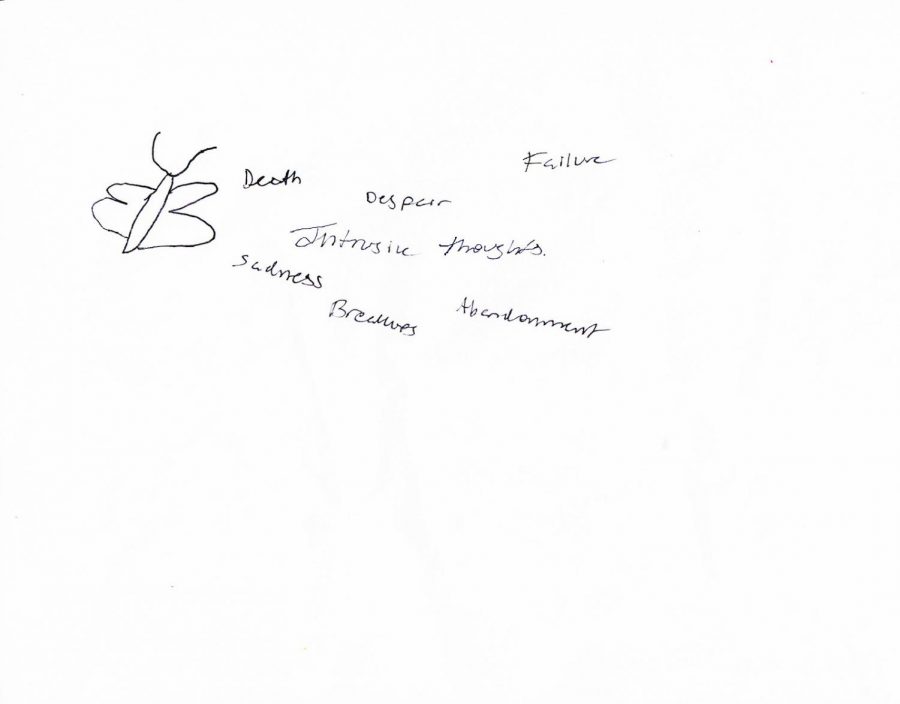OCD
The Butterfly Effect – Anonymous Junior (’20)
One of the first things any statistics teacher worth their salt will teach you is that correlation does not imply causation. On the other hand, one of the first things any science teacher worth their salt will tell you about the weather is that the flapping of a butterfly’s wings can cause a hurricane halfway around the world.
Obsessive Compulsive Disorder (OCD), as it plays out in my head, is a constant and exhausting battle between these two principles.

First, my brain will tell me that if I fail to perform x task, y catastrophe will happen. Eventually, this conditional works out enough times for OCD to get even the teensiest shard of credibility in the brain. Does the correlation imply causation? Probably not. Yet again, the tiniest action can cause a huge effect…maybe it is true. After it establishes even that little bit of doubt, OCD stays. Forever.
Some compulsions are rituals that I have to do every day to avoid the same catastrophe, or in every instance of a certain situation (for example, when a teacher is returning a test, I have to tap my foot five times before they call out the next name, or I’ll have failed the test).
My OCD does not just encompass school, but all aspects of my life. Some common rituals I’ve gone through include closing every app running on my computer before Skyping my ex-girlfriend (or else she’d break up with me) or having to watch every story from my Instagram followers before getting on a plane (or else the plane would crash). Send this text with absolutely perfect grammar (or everyone will hate you). I think the worst ones, however, were the ones where the consequence would be my dying young. Tell me exactly what a teenager with a semi-to-moderate will to live past 30 wouldn’t do to minimize the risk?
Despite the grueling task of averting my personal crises, it’s nothing compared to what happens when my catastrophic scenarios drag other people down the rabbit hole. It’s one thing when it’s my life in my hands but an entirely different thing when another’s life or security is in the balance. In the spring of my sixth grade year, my landline telephone rang. My OCD immediately sprung into action — “Answer this call or something will happen to Grandma.” There was one catch: the call was from an unknown number, and my parents didn’t allow me to answer those kinds of calls, under penalty of being grounded. I let the phone slip through my fingers and hung up. My grandma, who was suffering from dementia at the time, fell to her bathroom floor, and her memory of me fell through the porcelain cracks. The next time I saw her, she was in a nursing home, and she didn’t remember my name. She died five months later.
I still carry that guilt with me. Part of me knows that what eventually happened was inevitable, but sometimes, in my weaker moments, I still wonder what would’ve happened if I had picked up that phone. Would my grandmother have been able to see me graduate middle school, or dance with me at my bat mitzvah?
On the bright side, therapy has been an incredible help, and I am getting better. My therapist, who is like me in many ways, specializes in exposure and response therapy (ERT). It basically involves purposely breaking rituals to make the consequence of these rituals seem untrue because usually, they don’t happen. I’ve been able to stop tapping and app-quitting and many other of my rituals. It isn’t always easy, as anxiety will skyrocket during the first exposure. Some are easier than others — it’s easier to accept the possibility of one bad grade on a test because you didn’t tap than it is to risk being six feet under by 14 if you don’t watch that one last story on Snapchat. I’m also taking Lexapro, and, after finding a dosage that didn’t hit me with every possible side effect, it’s working well with therapy to quiet the voices in my head.
If you have OCD, I know ERT will sound scary. I was utterly terrified the first time I did it. But ultimately, the temporary horror of ERT is worth not living a life afraid of your mind. I’ve learned that.
If you don’t have OCD, please do not minimize our condition by saying you’re “OCD” about keeping your room clean or organizing your files. If you don’t fear something will happen by not doing something, you don’t have OCD. Also, please don’t just think of OCD as a neatness thing; it’s not. My room is a pig’s sty, and I like it that way. Just don’t read the names of people too fast when handing back a test or I’ll have a heart attack. There are many forms of OCD, not just one.
And, if you have OCD and don’t know who to talk to about it, or if you feel like a terrible person because of the intrusive thoughts in your head, please talk to someone who can support you at East (e.g. a guidance counselor), or look up local therapists and talk to your parents about seeing one. The school nurses and Student Assistance Counselor Mrs. Jen DiStefano are also great resources. But please, don’t suffer in silence like I did for so long.
